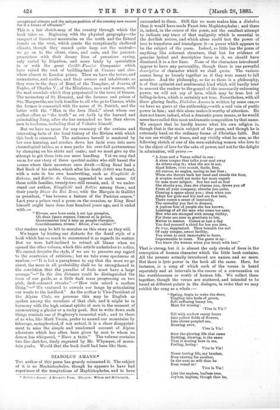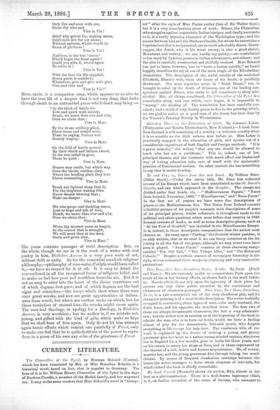DIABOLUS AMANS.*
THE author of this poem has grossly misnamed it. The subject of it is no Mephistopheles, though he appears to have bad experience of the temptations of Mephistopheles, and to have succumbed to them. Still this no more makes him a diabolus than it would have made Faust into Mephistopheles ; and there is, indeed, in the coarse of the poem, not the smallest attempt to indicate any trace of that malignity which is essential to _ the devilish nature, and which alone could test the power of love to transform and transfigure it—a power which-appears to be the subject of the poem. Indeed, so little has the poem of anything like coherent structure, that but for evidence of genuine lyrical and descriptive force in it, we should have dismissed it in a few lines. None of the characters introduced appear to have any personality, though there is one powerful description of character which we shall quote. The various scenes hang as loosely together as if they were meant to fall asunder. And the philosophy, so far as there is a philosophy, is of that optimist and sentimental kind which will hardly tend to convert the readers to the gospel of the necessarily redeeming power, we will not say of love, which may be true, but of falling-in-love, which is certainly not true. Nevertheless, with all these glaring faults, Via bolus Amans is written by some one,— we have no guess at the authorship,—with a real vein of poetic power in him ; and this alone makes it worthy of attention. He does not know, indeed, what a dramatic poem means, or he would
neverhave called this most undramatic composition by that name We suspect that he hardly knows what his own religion is, though that is the main subject of the poem, and though he is extremely hard on the ordinary forms of Christian faith. But he can see vividly at times, and say vividly what he sees, as the following sketch of one of the men-subduing women who love to be the object of love for the sake of power, and not for the delight in admiration, will prove :—
"A Juno and a Venus rolled in one :
A siren tongue that talks your soul away As others sing it; what the sex is not, Good fellow, civis mundi, facile, free, All curves, no angles, saving to her foes ; When she throws back her head and treads the floor, A sceptre would not make her more superb Or men more subject. See her and at first She shocks you, then she charms you, draws you off From all your company, absorbs you quite, Clearing a space about you; then when you Adopt her gods and kin and are fast hers, There comes a sense of insecurity, The unreality you feel in dreams, A jealous fear of people she has known, Loathing of all the men who come too near, Men who are stamped with strong virility, For these are sure to gravitate to her, Matter to matter. Comes at last a day You find yourself a third for her you love,
.De trop, supplanted. Then beneath the soil
Of easy temper, sweet facility, You come to rock immovable to force,
Impermeable to tears.The game is up :
You know the woman when you break with her."
That is strong, but it is almost the only stroke of force in the conception of human character which the little book contains. All the persons actually introduced are names, and no more. But there is lyric power in the book all the same. Here, for instance, is a song of which each of the verses is heard separately and at intervals in the course of a conversation on the worthlessness or worth of human life. We collect them together, though the verses are scattered, and intended to be heard at different points in the dialogue, in order that we may exhibit the song as a whole :—
"Spring, begin to wake the done, Tingling into buds of green, Soft suffusing loamy lea,
Meet for musing : Vive la Vie !'
Till with mellow sunny hours Into yellow fields of flowers, Into clover-purpled sea, Running over, Vive la Vie !
Sure the glowing life that came Budding, blowing, is the same That is moving here in me, Feeling, loving : Viva Is Vie!
Never having life, my brother, Ever craving for another,
In the next so wilt thou be Ever vexed so!
Vive la Vie !
Like the sapless, leafless tree, Joyless, hapless, though thou be, Only live and soon with me, Shout thy vivo and Viva la Vie !
Grief why grieve for, making moan, Grief doth live for joy alone ; Without sadness, where would be Sense of gladness ?
Vive la Vie !
Nathless, in the last 'amen' Who'd begin the feast again ? Could you give it, who'd agree To relive it ?
Vive la Vie !
With the best his life supplied, Every guest is satisfied ; Wherefore, give and give with glee, Vive and viva and Viva la Vie !"
Here, again, is a companion song, which appears to us also to have the true lilt of a despair that is not very deep, that looks through death to an untroubled peace which death may bring
"In the thick of battle we
Live and quick with misery, Death, we name thee o'er and o'er, Ours we claim thee : Vive la Mort.
By the dense artillery plied, Sinew tense and nostril wide, Those be raging, furious war Sternly waging : Vive la Mort.
On the field of battle poured, By their shield and broken sword, In the riot rolled in gore, These be quiet : Vive la Mort.
Drums may rattle, but which way Goes the battle, careless they, Where the bending plain they tore Fierce contending : Viva la Mort.
Break not lightest sleep that is, For the brightest waking bliss Never deeper blessing bore ; Wake no sleeper : Viva la Mort.
We who grope and darkling move, Lost to hope and left of love, Death, we name thee o'er and o'er, Ours we claim thee : Viva la Mort.
When thy morrow come at length, In the sorrow that is strength, We will meet thee at the door, Smile and greet thee, Viva la Mort."
The poem contains passages of vivid description. But, on the whole, though we see in it the work of a writer with real poetry in him, Diabolus Amans is a very poor work of art, without drift or unity. As for the somewhat mawkish religious philosophy,—philosophy of rose-water, Carlyle would have called it,—we have no respect for it at all. It is easy to detect the conventional in all the recognised forms of religious belief, and to make us feel how poor and worthless formulas are. But it is not so easy to enter into the heart of the divine experience out of which dogmas first grew, and of which dogmas are the best signs and reminders,—the buoys which show where there were once great wrecks, and now are great opportunities of deliverance from wreck, but where are sunken rocks on which, but for these reminders of eternal love, the wrecks might occur again. The rose-leaf theology, or apology for a theology, in Diabolas Amans, is very worthless ; but its author is, if we mistake not, young, and gifted with the kind of gifts which make us hope that we shall hear of him again. Only do not let him attempt again heroic efforts which remind one painfully of Faust, only to make one feel that he is quite destitute of the power to reproduce in a poem of his own any echo of the greatness of Faust.



































 Previous page
Previous page